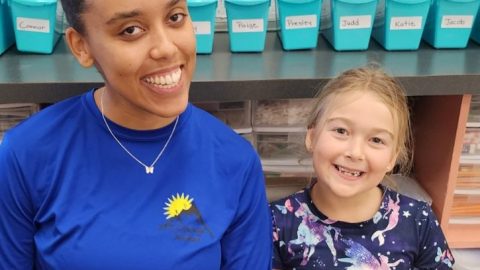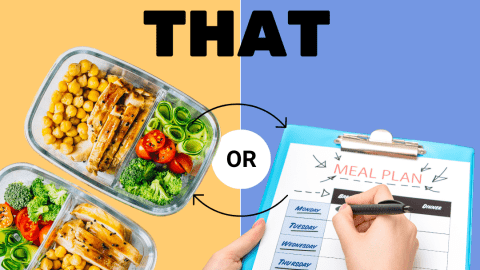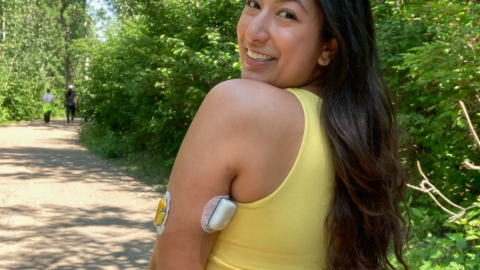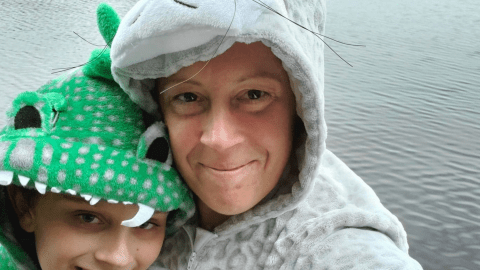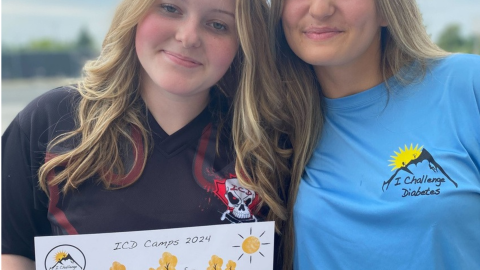Recently football fans and nacho fans alike celebrated the Superbowl. While I personally am not a big football watcher one thing I really appreciate about team sports is that the dynamics are ever-changing, and always evolving…which is not unlike diabetes management.
As with sports, there are the aspects we can control and the ones we can’t. While there are many factors you may not be able to specifically control ARE able to control your responses, and roster you recruit to help. Before I kick it off with some tips that have been really helpful for me personally, I want to put out the disclaimer that I am not a physician or mental health professional. I have studied extensively but I am not a doctor. There is no shame in seeking help, discussing strategies with your health team. I’ll link some resources at the end of this post, I just want to put it out there that you matter, your story has value and could even be helpful to someone else. You deserve to thrive in your physical health but also in your mental health. The two are often linked. It is wise to talk to your doctor if you have any concerns.
There is a football term I particularly like, unnecessary roughness. It is exactly what it sounds like and it also applies to our health. Be gentle with yourself, you don’t get healthier or happier long term by blaming yourself for things outside of your sphere of control. We’ve all had days of the diabetes rollercoaster, any unexpected high, which leads to a “rage bolus” which leads to a low. We’ve all had days or weeks that are just off despite our best efforts. Beating yourself up about a high or a low will only leave you feeling miserable and will not help solve the root cause. Be kind to others and to yourself. We are just doing the best we can with the tools we have to work with. Instead, get curious, give yourself permission to look for patterns, does this happen around the same time every day? Does it happen around the same time of the month? (especially for my ladies out there) When I don’t work out, when I do work out? (Remember that a workout can impact your blood sugars for up to 72 hours afterwards depending on the type and intensity of training.) This is a lot to consider, diabetes doesn’t happen in a vacuum, give yourself tons of grace if things aren’t where you want them to be but do pay attention. This may seem really obvious but tracking these trends can really help you notice patterns that can help you be more prepared. CGMs are probably the best way to do this. If CGMs are a big financial challenge one good solution can be downloading your meter to get a graph print out or to participate in a study if you’re eligible and able. Not only do you get a lot of time to speak with people who are really specifically trained but you usually get access to really good diabetes care and tools. Old fashioned written logs or keeping a note on your phone can also be a really great way to give you and your healthcare team a more detailed picture of what’s going on. If you’re the type to like a planner or printable sheets here’s a great website with different logs so you can find one that fits your style and needs. Logging is a great tool. It’s free, simple and can be really helpful.
We can get into the trap of thinking “I was in such a good place; I was doing so well!” Then BAM! A combination of circumstances can have our minds quickly in a negative spiral. It’s not about never having a trial or a negative thought. That’s an unrealistic expectation. If you expect it to be perfect every time you will always feel like you’re failing. You’re not. Reframe, use the tough moments as indicator lights and start to pay attention to what you might need right now. The bottom line is, no unnecessary roughness! Be kind to yourself, don’t get mad, get curious. At ICD we like to say there’s no bad number or bad diabetic. It’s simply information, information helps you get answers so you can get on your way to feeling your best. All testing is good testing!
Now that we’ve got the fouls covered let’s focus on the team. Relationships are so fundamental to how we experience life, what we focus on, where we place our value. Healthy relationships create a container of psychological safety which helps us to feel safe, process and explore our experiences. At ICD we always strive to help create conversations and practices to help people know themselves better and their teammates better, it begins with you and extends out to others. One of the reasons it’s so important to consider where we’re at in our headspace is because it has ripple effects, it impacts all of our relationships. With all the challenges of being distanced and isolated, we’re all vulnerable right now, vulnerable to misunderstandings, to believing the lies we may tell ourselves about ourselves and to focus on the negative. I don’t know about you, but I’ve noticed fear creeping into all spheres of my life and dominating too many conversations. In the midst of so much uncertainty staying positive has to remain at the core of our consciousness. Optimism is the fundamental belief that things are going to work out. It is not denying the bad, it is not a lack of challenge, but rather a cognitive choice. Optimism is at the core of mental toughness and luckily it is a trainable skill. How do we train it? How do we build strength under stress?
1. Expect trials! It’s pretty much a given. We are going to have bad days; we are going to have unexpected things pop up. It’s going to be tough some days. But the good news is, you can manage it! Learn the lessons that will help you move forward. It is hard, but you CAN do hard things.
2. Be prepared! Being prepared to face struggles definitely helps. For fun I like to run ultra-marathons, in camps before race day you would hear the phrase over and over, “nothing new on race day”. That’s because the runners had prepared they had made sure to equip themselves with the right tools and tested them out so that they were ready. Not only is this a great boost for your emotions and feeling ready to tow the start line it also practically helps so that when you face a challenge you have tools in your toolbelt to deal with it. Put some Dex in your bag, test before you leave the house, take insulin before you start eating. Having tools ready will make it easier to manage your diabetes but it will also reassure you if you’re especially prone to anxiety that you’ve done the best you can do to be ready. You can relax and know that you’ve got the tools. Not everything is within your sphere of control and that’s okay. Take action where you can and let go of the rest.
3. Gratitude! No matter where you’re at. No matter what challenges you may be facing I guarantee you have something to be thankful for! Did you just read this? You can be thankful for receiving an education that blesses you with the ability to find information easily. Did you breathe in? Breath in your lungs is something to be thankful for! Did you eat today? I personally am always thankful for coffee and chocolate. I am thankful for a strong body that can walk and do push-ups, I am thankful for good music, for people who love me, for the people who I love. If you’re in a bit of funk being grateful can really shift your perspective. I usually thank God for a few things before I get out of bed but you can practise gratitude in a lot of really cool and creative ways. Telling the people you love that you appreciate them, writing down your list in a gratitude journal. Taking a moment to appreciate the small things. No matter how awful things may look I promise there’s something to be thankful for.
Celebrate your team! While Diabetes is a personal challenge you are not alone. Managing Diabetes can be a lot easier with a good team! Who’s on yours? Make sure you take time to intentionally connect with friends and family! We need each other now more than ever. Call someone, send them a text, send them a letter. I have been loving sending and receiving snail mail during this pandemic! It can be incredibly simple. A meme, “I miss your face”, “you are so amazing at ________ I really appreciate that about you.” It doesn’t have to be complex but letting others know you care makes a big difference, also it’s free and takes only a few moments. I personally love getting together with a couple of friends on Houseparty, we like the avocado game.
ICD is also hosting some awesome events virtually which you can check out here. We aren’t meant to do life alone and self-care can’t replace living in community. It is through others that our brightest gifts can shine and how we can tackle the biggest challenges, we learn from each other and we pick one another up when we’re down. If you take anything away from this know that you have so much value, sometimes it takes others to highlight our strengths that we didn’t even know we had. Let’s be a community that builds one another up! Who’s on your team? who can you text? And if you need a team, we’d love it if you’d be part of ours!
Elizabeth Harvey has been an ICD participant, volunteer, staff member, fundraiser and advocate. A plant-powered climber and runner, you can find her posts about health, Diabetes and outdoor adventuring on her instagram @elizabeth_harvey_
Our community blog is written by a diverse group of ICD participants and supporters. We are grateful to be able to share the various perspectives of our community with you. These are opinions, not medical advice, and may or may not be right for you!

